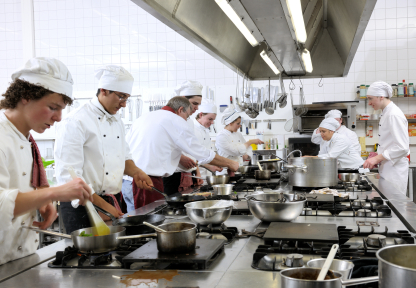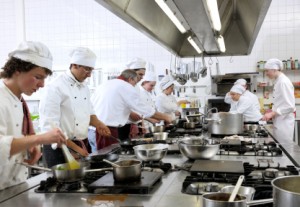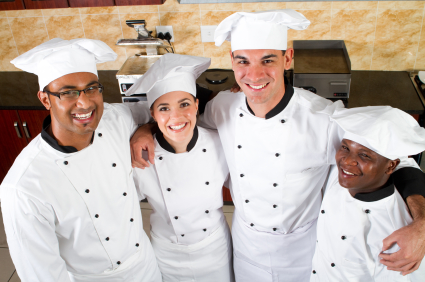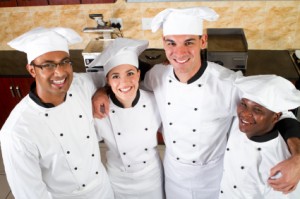Chefs and specialist chefs prepare and cook complete meals, banquets or specialty foods such as pastries, sauces, soups, salads, vegetables, meat, poultry and fish dishes, as well as create food displays. They instruct cooks in preparation, cooking, garnishing and presentation of food and they supervise cooks and other kitchen staff. They may plan menus as well as requisition food and kitchen supplies.
Commis
The commis is an entry-level position. Also known as an assistant or apprentice, the commis works under the line cooks (chefs de partie) to learn particulars of a station, through food preparation and plating. Though the commis may seem to have a lowly position in the kitchen, the experience is invaluable. Besides gaining knife and prep skills by working with chefs, the commis will experience the pace, pressure, and demands of a kitchen.
Pastry Chef
Pastry chefs must have the knowledge to create different kinds of baked goods and confections, as well as be able to take on special projects. They must also be creative, have a good aesthetic eye, and understand the principles of taste and flavor in desserts.
In the corporate environment of a large hotel, the pastry chef typically reports to the Executive Pastry Chef, who reports to the Corporate Pastry Chef. Below pastry chefs, in the typical restaurant structure, are Assistant Pastry Chefs and line employees.
A good pastry chef must be an exceptional manager of people, be able to coordinate staffing with production requirements. Must be able to keep track of costs and be in charge of ingredient ordering.
Saucier
Among the kitchen positions known as “section chefs,” the saucier (sah-see-ayy) is relatively prestigious. This person makes all the sauces, and sometimes might make meat dishes cooked in a particular sauce. Because sauces are the foundation of French haute cuisine, the saucier might be considered “the keeper of the flame” in the traditional French-based restaurant kitchen.
The classically trained saucier knows that the basis of all sauces are the five “Mother sauces.” The first is Espagnole (or Brown Sauce), made from a dark roux of cooked flour and butter, along with brown stock made from roasted bones and vegetables. Veloute is a white sauce, made with a pale roux and a light stock. Bechamel is a basic white sauce made of flour, butter, and milk, to which cheese is often added. Vinaigrette is oil and vinegar, usually flavored with garlic, shallots, or herbs. And Hollandaise represents the emulsified sauces of egg and oil or butter, which include Mayonnaise.
Sous Chef
The sous (“soo”) chef is the second in command after the chef de cuisine or executive chef in the kitchen, almost like the first mate to the captain. Sous is French for “under,” and the under chef is the unsung hero of the kitchen, the one who makes things run. While the executive chef’s name is on the menu, it might well be the sous chef who created–and cooked–the dish that’s on the table in front of you.
Sous-chefs supervise the activities of specialist chefs, chefs, cooks and other kitchen workers, and they may demonstrate new cooking techniques and equipment to cooking staff. They may plan menus, requisition food and kitchen supplies, and prepare and cook meals and specialty foods.
Executive Chef
Executive chefs plan and direct food preparation and cooking activities in restaurants, hospitals or other establishments with food services. They plan menus, ensure that food meets quality standards, estimate food requirements, and may also estimate food and labour costs. They supervise the activities of sous-chefs, specialist chefs, chefs and cooks, and they recruit and hire staff. They may cook food on a regular basis for special guests or functions.
Some executive chefs are very hands-on, in their restaurants every day and night, actually preparing dishes or finishing the plates to make sure everything that leaves their kitchen is perfection. At the opposite extreme, the executive chef may have created the dishes and settled the menu, but leaves the sous chef to do all the day-to-day running of the kitchen while the executive takes time to write a cookbook or travel.
Garde Manger
Like most kitchen positions, the Garde Manger is a highly specialized line cook who is responsible for all cold food presentation, such as composed salads, pates, canapes and hors d’ouevres–everything cold that might appear on a buffet table. The garde manger chef handles all cold sauces, such as vinaigrettes and dressings, as well as aspics, pickles, chutneys and relishes. In a large corporate setting, the garde manger chef could be responsible for ice sculpture and large-scale food still-lifes to decorate a buffet table.
A Personal Chef
A Personal Chef is someone who loves to cook and help families gather around the table again for a meal together. Busy, time-starved families need the services of a Personal Chef in order to avoid frozen pizza, fast food joints, or expensive restaurant dining. A Personal Chef will complete a family interview to determine dinner time favorites, discuss allergies and dislikes, then shop for all the fresh ingredients and go to their client’s homes to prepare delicious meals to their client’s specifications.

 Do you dream of becoming a chef some day? Perhaps you’d like to be a celebrity chef like Wolfgang Puck or Bobby Flay. Many of the best culinary schools produce future celebrity chefs. However, there is more to top culinary schools than merely turning out famous chefs. There are many underlying factors to consider in choosing a culinary school.
Do you dream of becoming a chef some day? Perhaps you’d like to be a celebrity chef like Wolfgang Puck or Bobby Flay. Many of the best culinary schools produce future celebrity chefs. However, there is more to top culinary schools than merely turning out famous chefs. There are many underlying factors to consider in choosing a culinary school.
 If you are passionate about food and love cooking, you may want to become a chef. The best way to start your cooking career is to attend a professional cooking school. A culinary school will prepare you to work in restaurants, bakeries, catering and “food to go” services. You have to know what to look for and what to expect from a professional cooking school.
If you are passionate about food and love cooking, you may want to become a chef. The best way to start your cooking career is to attend a professional cooking school. A culinary school will prepare you to work in restaurants, bakeries, catering and “food to go” services. You have to know what to look for and what to expect from a professional cooking school.
 Cooking is a skill, but cooking great food is an art. Some people spend a lifetime perfecting their culinary style and technique. If you want to master cooking, whether for fun or to become a professional chef, culinary classes can get you started on the right track.
Cooking is a skill, but cooking great food is an art. Some people spend a lifetime perfecting their culinary style and technique. If you want to master cooking, whether for fun or to become a professional chef, culinary classes can get you started on the right track.